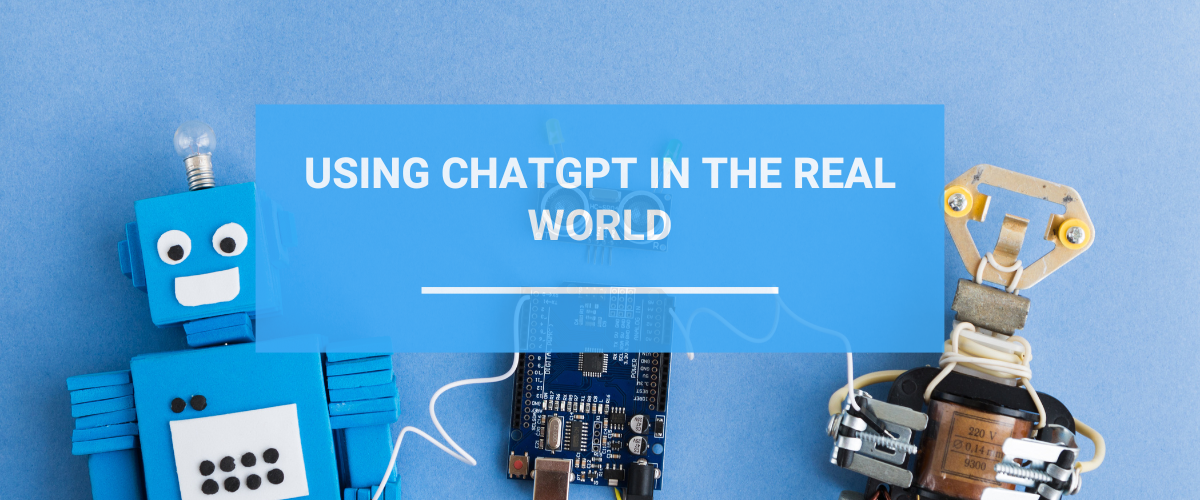Using ChatGPT in the real world

Last week I wrote a LinkedIn post about ChatGPT and how it could soon replace me in my role as a marketer, copywriter and technical sales person. But how practical was that idea? I've spent the intervening week trying to use ChatGPT in my everyday work life, and I'll share some observations about why I think it's ready for the mainstream.
What is ChatGPT?
ChatGPT is a cutting-edge natural language processing technology - a form of Artificial Intelligence - developed by OpenAI. It uses a powerful deep learning algorithm to generate human-like responses to text-based queries in a conversational manner. This technology has the potential to revolutionize the way we interact with computers, allowing for more natural and intuitive communication.
At the heart of ChatGPT is a state-of-the-art language model trained on a massive amount of data. This model is able to process and understand the nuances of human language, making it capable of generating highly relevant and coherent responses to a wide range of queries.
One of the key benefits of ChatGPT is its ability to handle long-form conversations. Unlike traditional chatbots, which are often limited to providing simple answers to specific questions, ChatGPT is able to maintain a consistent conversational flow, allowing for more natural and engaging interactions. This is achieved through the use of a sophisticated memory component, which enables ChatGPT to keep track of the context of the conversation and generate responses that are relevant to the current topic.
Another advantage of ChatGPT is its flexibility. It can be used in a variety of applications, from customer service chatbots to personal assistants and beyond. This flexibility makes it an attractive option for businesses and individuals alike, who can use it to improve their efficiency and productivity.
One of the main challenges facing ChatGPT is the issue of bias. Like all artificial intelligence systems, ChatGPT is trained on a dataset that reflects the biases of the real world. This can lead to the generation of responses that are biased or offensive, which can be a serious concern for businesses and individuals using the technology. However, OpenAI is working to address this issue by developing ways to mitigate bias and ensure that ChatGPT generates unbiased responses.
What have I used it for?
This week I've been writing blog posts and tender responses, and have experimented with both.
There's a lot of people, including the CEO of OpenAI saying that ChatGPT is still in the experimental stage, and not fit for production use.
But my experience has been that in many ways it's ready for use in production, although under close supervision. I've used it to generate content on a number of subjects. All of which I have a reasonable domain knowledge of so I can validate the accuracy of what is written.
Now I wouldn't use it to write copy about a subject I couldn't validate myself, but it has saved me a vast amount of time writing simple content about moderately complex technical subjects, and it's done it very well.
It's not without limitations:
- It can't start from nothing - you have to seed it with questions, and it sometimes doesn't answer that well, or doesn't construct a meaningful or rich response. It takes a human to ask the follow up questions that can lead to an interesting article or thought piece;
- Responses aren't localised for British English, so there is a need to localise the content that is produced;
- It doesn't demonstrate the evidence to back up assertions it makes in articles. Ask it if there is evidence that vaccines save lives and it will tell you they do, but ask it to show the evidence and it will repeat the same assertions or make weak references to studies by the WHO or published in the Lancet but not the actual evidence. One workaround is to reverse engineer the references so you can be confident of your facts;
- It can't yet search the internet - I asked it to write copy about the economic demographics of East Hampshire for a fundraising proposal and it said it couldn't, no matter how I phrased the question. This data all exists but the model hasn't been trained in enough detail to identify that East Hampshire is highly affluent but with pockets of multiple deprivation in the lowest 20% of district, I had to research and write that myself;
- It's knowledge is limited to the end of 2021 - it knows a lot about Umbraco but nothing about compostable DXP which is a software class that really has only existed for the last few years;
- It can be contradictory - I mentioned this in my first LinkedIn post, who should use Umbraco includes people that value security because it is regularly patched, who shouldn't use Umbraco includes people that don't value security, because it's been vulnerable in the past. To be fair to the model I know many technical sales people who spout contradictory nonsense either because they don't understand the content or they want to confuse the audience;
- It can't cope with the load yet - there are far too many people putting load on ChatGPT such that it frequently errors in very ungraceful ways, and access is now being restricted at peak times.
But honestly, notwithstanding the issues that are here, ChatGPT is a powerful tool which you should beta test now to figure out how you can use it in your business.
I can totally imagine an extension to Google Docs so that I embed a conversation from ChatGPT into the document I'm writing. I think that could even enhance the workflow in Umbraco, for example, with a simple bit of custom package development you could embed conversations from ChatGPT right in the heart of a blog article like this.
If you're a HR consultant looking for content on the latest legislative changes to rates of pay in England in 2023, you'll be fresh out of luck - you should avoid pieces that require 100% factual accuracy or knowledge which is timely.
But if you're a technical development agency looking to write a high level opinion piece about the value of ChatGPT, then interviewing ChatGPT could save a lot of time and effort.
RELATED BLOG POSTS
Users are less intimidated by shorter, more meaningful URLs that consist of words (not lots of numbers and codes), and while Google is good at indexing even complex URL structures they consider it to be best practice to choose page URLs that are more human friendly. That means using a web CMS which enables editors to choose their own URL, such as Umbraco, and then choosing names that are short and meaningful, and not stuffed with keywords in a vain attempt to game the Google indexing bot. Read more about good URLs in the Google SEO starter guide. At Carbon…
READ MORE
